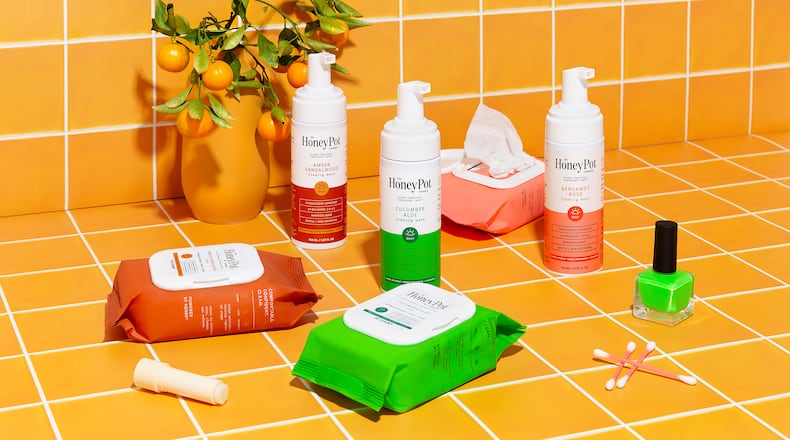The Honey Pot Company, an Atlanta-based and Black-founded feminine care brand, has been acquired by Compass Diversified (CODI), a publicly traded holding company, in an all-cash, $380 million deal, the companies announced Tuesday.
Honey Pot was founded in 2012 by Beatrice Dixon and Simon Gray. The company sells feminine hygiene washes, menstrual pads, tampons and other personal care products, which can be found in more than 33,000 U.S. stores, including Target and Walmart, according to the release. Honey Pot has brought over 60 products to market since it was founded.
Credit: Speci
Credit: Speci
“Beatrice and her team have done an amazing job building The Honey Pot Co. into a leading feminine care brand that has distinctive category ownership and unique brand positioning,” Elias Sabo, CEO of CODI, said in a statement. “We believe they have tremendous growth opportunities on the horizon.”
Dixon, who serves as the company’s CEO and chief innovation officer, will continue to lead Honey Pot under its new owners and her management team is staying on. They will also retain a minority stake in the company.
Dixon wrote on social media that the deal aims to accelerate Honey Pot’s “plans to become the largest personal care brand in the world.”
“With Compass Diversified’s shared value and vision of the future of personal wellness, The Honey Pot will soar to breach boundaries of what a wellness brand can do within the commercial marketplace,” she wrote.
For years, Dixon had been open about wanting to eventually sell her company.
“I absolutely do want to exit my company and I’m so vocal about that because culturally as a Black woman, getting investment dollars or exiting your company can be looked at as selling out,” she said in a 2020 interview with The Helm.
“I want to be public that there’s no shame in exiting your business because that’s how you’re going to get to wealth. Once you can get to wealth financially, you’re able to really contribute to your community, to your family, to yourself. You’re able to see the fruits of your (expletive) labor.”
Credit: Mirtha Donastorg
Credit: Mirtha Donastorg
Sabo said on a call with investors Tuesday that CODI sees an opportunity for Honey Pot to increase its brand awareness and take a larger share of the $17 billion personal care industry, particularly from legacy brands that may not resonate with Gen Z consumers.
The deal comes at a time when global mergers and acquisitions hit their lowest level in a decade, according to Axios. In the U.S., deal activity fell six percent in 2023.
Jewel Burks Solomon, managing partner of Atlanta-based venture firm Collab Capital (which was not an investor in Honey Pot), wrote on LinkedIn that “getting a deal of this magnitude done right now deserves immense adulation, respect and applause.”
CODI currently owns at least nine other companies. The Honey Pot acquisition is the fourth-largest purchase price of the brands currently in its portfolio.
But Sabo told investors that in a better market for consumer products companies, Honey Pot probably could have sold for even more, perhaps twice as much as CODI paid.
“This is a company that I think in different market conditions could have traded at a 50 to 100 percent-multiple premium to what we paid,” Sabo said.
In 2023, Honey Pot had more than $121 million in gross sales, according to the investor call, with an adjusted earnings of approximately $29 million. Since 2020, the company’s gross sales have increased more than 50 percent.
The acquisition is expected to close in February.
The Atlanta Journal-Constitution and Report for America are partnering to add more journalists to cover topics important to our community. Please help us fund this important work at ajc.com/give
About the Author
Keep Reading
The Latest
Featured





